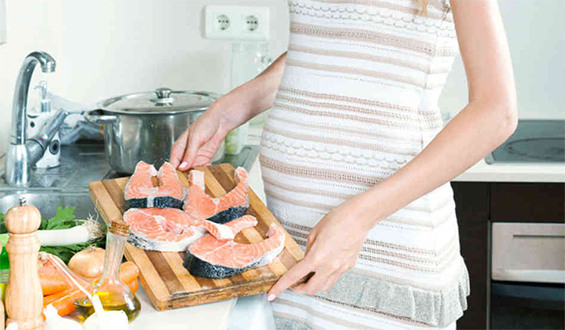
Scientists and medical experts have long known that most things a woman does during her pregnancy can have an effect on her child. Now a new study from Spain has found that a mother eating a few servings of fish a week while pregnant may result in children having higher scores on cognitive function and fewer Autism Spectrum Disorder (ASD) traits — and the amount of fish eaten in a week does not have to be large.
The research team used data from roughly 2,000 women who were pregnant and were asked about the foods they ate, including the number of times they ate fatty fish in a week. The fatty fish included salmon, mackerel, sardines, swordfish, tuna, and anchovies. The scientists also asked if the mothers-to-be ate lean fish, smoked fish, and shellfish during the week, reports Forbes’ Alice G. Walton.
The team followed up with the mothers when their children were born and gave the children cognitive function tests at 14 months and 5-years-old. The children were also tested for ASD.
The result was that children whose mothers consumed more fish throughout their pregnancies had higher scores on their cognitive function abilities and fewer autism spectrum traits. The average amount of fish eaten by the women who were tested was about three servings. However, for every additional 10g beyond the US recommended 340g a week, their kids had corresponding small gains in cognitive scores.
Study author Jordi Júlvez, of the Centre for Research in Environmental Epidemiology, said:
“We have found that there is a saturation of the benefits of eating fish. Taking three or four weekly servings of fish (around 600 g) provide the same benefits as taking more,” said Júlvez.
Fish consumption during the first trimester seemed to have the most measurable effect on cognitive growth in the youngsters. Researchers believe the contributing factor may be the omega-3 fatty acids in fish because they are necessary for neural development and general brain function.
The FDA has issued advice to US pregnant women, saying it is acceptable to eat up to 12 ounces of fish a week during pregnancy but to stay away from certain seafood including raw fish, tile fish from the Gulf of Mexico, king mackerel, and swordfish. All of these fish are high in mercury, according to Headlines and Global News’ Suzette Guitierrez.
“Seafood is known to be an important source of essential nutrients for brain development, but at the same time accumulates mercury from the environment, which is known to be neurotoxic,” Júlvez said.
But even up to 21 ounces of fish per week did not affect the mercury levels in the pregnant women involved in the study, reports Reuters. The European Food Safety Authority endorses 150g to 600g of fish weekly if pregnant, but Júlvez writes that since the effects of fish consumed during an unborn baby’s development are still not completely understood, women might want to wait on greater consumption until clearer guidance can be given.
The information used in the study was from the Spanish Childhood and Environment Project, a study of Spanish women and children between the years 2004 and 2008.



